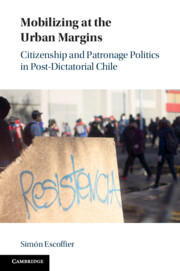Book contents
- Mobilizing at the Urban Margins
- Mobilizing at the Urban Margins
- Copyright page
- Contents
- Figures and Tables
- Acknowledgments
- Abbreviations and Acronyms
- Terms
- Introduction
- 1 The Mobilizational Citizenship Framework
- 2 The History of Mobilization in Chile’s Urban Settings
- 3 The Demobilization of the Urban Margins
- 4 Memory of Subversion
- 5 We, the Informal Urban Dwellers
- 6 Protagonism and Community-Building
- Conclusion
- Book part
- References
- Index
3 - The Demobilization of the Urban Margins
Published online by Cambridge University Press: 25 May 2023
- Mobilizing at the Urban Margins
- Mobilizing at the Urban Margins
- Copyright page
- Contents
- Figures and Tables
- Acknowledgments
- Abbreviations and Acronyms
- Terms
- Introduction
- 1 The Mobilizational Citizenship Framework
- 2 The History of Mobilization in Chile’s Urban Settings
- 3 The Demobilization of the Urban Margins
- 4 Memory of Subversion
- 5 We, the Informal Urban Dwellers
- 6 Protagonism and Community-Building
- Conclusion
- Book part
- References
- Index
Summary
This chapter begins the book’s comparative ethnographic enquiry. While the scholarship has advanced several explanations for the post-authoritarian deactivation of the underprivileged across Latin American cities, little is known about the trajectories by which mobilization survives in some neighborhoods and not in others. This chapter focuses on the case of Nuevo Amanecer to better grasp the mechanisms that led to the demise of collective action in post-dictatorial urban Chile. It describes how party activists belonging to the Alianza Democrática developed a managerial leadership style in many underprivileged neighborhoods when coordinating anti-dictatorial protests in the 1980s. The relationships these moderate political activists fostered with neighborhood dwellers throughout the decade often evolved into networks of political loyalty after the democratic transition. These networks are current and ongoing. To feed their political loyalty networks, community leaders learn to insistently monopolize political capital at the grassroots level. This dynamic has further prevented mobilizational citizenship from developing. It also fragments población spaces, deactivates local initiatives of governance, and depoliticizes the youth.
Keywords
- Type
- Chapter
- Information
- Mobilizing at the Urban MarginsCitizenship and Patronage Politics in Post-Dictatorial Chile, pp. 93 - 123Publisher: Cambridge University PressPrint publication year: 2023

